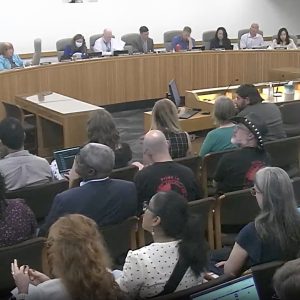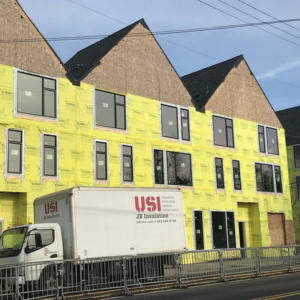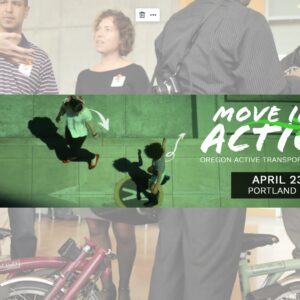“Since Metro seems to be easily cowed by the minority nowadays, and we have mayors who think it’s okay to flout the law, it’s time for a lawsuit.”
— Rex Burkholder, former Metro councilor
As we shared on Wednesday, the mayors of 21 of the 25 cities represented by Metro have signed a letter that calls for changes to a draft version of the Regional Active Transportation Plan (ATP) that would render it powerless. They say the wording in the plan is too strong, that it’s a “mandate”, and that if it’s absorbed into the all-powerful Regional Transportation Plan, the biking and walking projects in the ATP would wrestle precious funding from other road projects.
Yesterday that topic came up again at a meeting of regional leaders at Metro headquarters. Remember, at issue here is only a non-binding “resolution of acknowledgment” for work done on the plan thus far. Since the plan is being developed with some federal funding, a vote by Metro council to acknowledge its progress is required by the feds. But this vote has struck fear in the hearts of mayors from suburban cities surrounding Portland. What are they afraid of? Why do they want to delay this plan and weaken its language?
There’s more to this debate than just whether or not these mayors support more investment in biking and walking. While some of them surely oppose the thought of “taking away” money from more traditional road projects, others likely just don’t trust Metro. This tense relationship was clear in a meeting of Metro’s transportation advisory committee on August 1st.
At that meeting, Lake McTighe, Metro’s point person on the ATP, spoke about the urgent need for this plan: “While our roadway network is fairly complete, our regional bike network is only 50% complete and on major pedestrian corridors only 62% of them have sidewalks. Our trail network is only 30% complete. It’s hard to expect substantive outcomes for biking and walking when you have an incomplete network.”
During a comment period following McTighe’s presentation, Washington County Commissioner Roy Rogers singled out those comments. “The only correction I would make is when you say we have a fairly complete transportation system that’s not something we think we have. We cringe. If you want to come out to Washington County and change that wording a bit it probably would resonate a little better than telling us we have a complete network.”
But raising the flag about the word choice of a Metro staffer is one thing. Attempting to delay and neuter a major transportation plan is another. Rex Burkholder, a former Metro Councilor, says the mayors are simply doing whatever they can to avoid constructing bike infrastructure in their cities.
“The true intent of those who propose “weasel” words like “should,” “encourage,” “seek to” etc [referring to the mayors’ attempts to change the wording of the plan’s recommendations] is to avoid providing bike facilities required by state law,” Burkholder wrote in a comment here on BikePortland this week. Burkholder then cited the Oregon statute (ORS 366.514) that stipulates the federal mandate that requires transportation funding “shall be expended” to provide “footpaths and bicycle trails.”
“Note use of the word “shall.” No weasel word here. Since Metro seems to be easily cowed by the minority nowadays, and we have mayors who think it’s okay to flout the law, it’s time for a lawsuit,” Burkholder wrote.
Portland Mayor Charlie Hales has also now responded to this flare-up at Metro over the ATP plan. According to a Metro News story, Hales didn’t sign the letter because, “he didn’t think the plan is prescriptive, and that people who are walking or riding bikes don’t pay attention to city boundaries.” Here are more of Hales’ comments as reported by Metro:
“They want to get from here to there, so Metro’s doing what it needs to do in this case, which is lay down those maps of existing conditions and needed improvements in each mode,” Hales said. “I’m not interested in any erosion of that basic principle.”
He said some of his mayoral colleagues have an “underlying fear of Metro’s authority.”
“In this case, it’s just the authority to get us to work together,” Hales said. “I was just talking to a couple of the mayors after the meeting, and I think the revisions we’ve made to the draft have calmed those fears enough. I hope so.”
Metro Council is scheduled to hold a vote on the plan next month. We’ll keep you posted how it turns out.







Thanks for reading.
BikePortland has served this community with independent community journalism since 2005. We rely on subscriptions from readers like you to survive. Your financial support is vital in keeping this valuable resource alive and well.
Please subscribe today to strengthen and expand our work.
“…But this vote has struck fear in the hearts of mayors from suburban cities surrounding Portland. What are they afraid of? Why do they want to delay this plan and weaken its language? …” maus/bikeportland
Not too afraid to write up a letter suggesting changes to language in the plan relative to obligation to build. Apparently, the plan must have their vote in order for it to move forward. It appears they don’t find it smart to allow themselves to be pushed around.
Former Metro Councilor Rex Burkholder was quick to cite Oregon law and make accusations, but provided nothing to back them up.
“I was just talking to a couple of the mayors after the meeting, and I think the revisions we’ve made to the draft have calmed those fears enough. …” Portland Mayor Hales
What revisions is Hales referring to?
Roy Rogers is right, the transportation system isn’t complete… Lake McTighe is right, the roadway system is fairly complete…
now does Roy Rogers see where his transportation system needs improvement?
While I can’t say I’m familiar with Comm Rodger’s ideas about active transportation development in Washington County, I wouldn’t mind learning something more about what they are, such as to what extent and in what form he thinks active transportation infrastructure should be incorporated into the county’s present and future transportation network.
In the county, Rodger’s, for a long time, has represented and worked for people: http://www.co.washington.or.us/BOC/Commissioners/Roy-Rogers.cfm
Oh a replay of the Sellwood Bridge, exurban Clackamas motorists who use the bridge daily, dont want to pay for it. So Multnomah County and Portland goes ahead and builds it for them with all Multnomah County and Portland money and now we see Oregon pay for Washington’s bridge. Is it any surprise theres sprawl and traffic when inner cities pay for auto infrastructure for exurban commuters fleeing to lower taxes?
These are state and federal funds with strings attached, right. And the outlying communities are objecting to the projects that provide compliance with the strings but want to get the rest of the funds, right? Then simply withdraw the rest of the funds, except for the “string” projects and state the other money is being held until the compliance projects are complete. Since there is resistance to do what is required don’t allow a “promise” with weasel words included for the rest of the funds, release the rest of the funds after the required projects are complete.
“But this vote has struck fear in the hearts of mayors from suburban cities surrounding Portland.”
Jonathan, obviously area mayors had an issue with the plan, but why do you use the word “fear.” Was it their body language? Is everyone from a non-dense area a wimp? Or is your choice of words subtly unfair to those who may disagree with you?
I would ask you to re-write the sentence with fear in it in a more objective way. The mayors had reservations. They did not cower, they did not wet their pants.
I am disturbed by some of the mindsets on this blog- very us vs. them, often snobby.
Thanks for the feedback. Let me explain a bit why I used that word and still feel it’s appropriate.
– “strike fear in the hearts” is a common saying.
– by watering down the language and using stall tactics, these mayors are showing classic signs of fear in the political sense.
– sorry to ruin your narrative and speculation about me/this site being urban elitist and “snobby”, but the way I wrote this piece has absolutely nothing to do with an anti-suburban bias and has everything to do with the actions and words of these mayors.
Again. Thanks for your comment.
Jonathan, I do think this story would be improved with some more quotes from the anti-ATP perspective. Hopefully, those quotes would show their fear and back you up in telling us about it….
I qualified my remarks saying “some” folks are snobs. In general, you are even-handed. “Fear” still is not a good meme here.
Are you “afraid” of the suburbs, Jonathan? Of course not. And I bet you would prefer me to give you more credit than that- you are not “fearful” you have a certain perspective on density and transit that causes you to question aspects of suburbia. Do unto others as you would have them do unto you. Respect the person even when you disagree. Don’t attribute fear to the mayors as a way to dismiss their concerns.
I agree that “fear” isn’t a good meme if the aim is to encourage productive conversations. Thanks for the feedback. And I am not dismissing anyone’s concerns. You are speculating that I’m doing that based on your preconception about my beliefs.
Oregon Mamacita…I think you’re exactly right, that the mayors have issues with the plan…that is…with certain aspects of power some people would like the plan to have, but which the mayors apparently feel the people they represent do not want to be subject to.
I read through the plan rough draft this weekend. Not very hard to read, though very complex with a fair number of new concepts people wouldn’t generally be familiar with. Lots of good things in it.
Despite the open houses and whatnot, intended to broaden the public’s familiarity with the plan and what the plan seeks to accomplish, I doubt this is something that’s anywhere close to being generally known about.